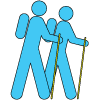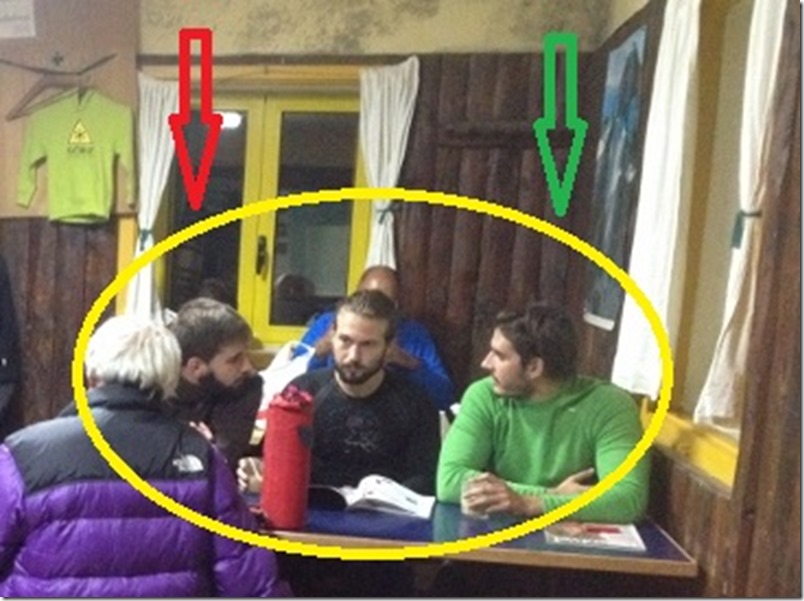Walking in a mountainous terrain is a dangerous activity, we know that, yet we still continue, because it is worth it. A calculated risk? Careful consideration is required to ensure the safety of yourself and others.
Our recent excursions made us appreciate how your approach might differ from others. Should you intervene when you feel others are at risk, or is it part of their personal learning curve.
The experience centred around our recent ascent of Monte Perdido. Three young men were attempting the same summit. We first became aware of them the day we reached refuge Goriz. They were excited. They were keen to obtain advice from as many as possible but we could never ascertain whether they were accepting of the advice or just wanted it to bolster their already confirmed attitude.
In part it would also seem they were hopelessly equipped, both in maturity, experience and equipment. Now equipment is brought, experience has to be learned, but can be obtained, in part, through extensive research.
Maturity is another matter, lets also call it common sense.
Amongst the three, one was a distinctive leader who also had, unfortunately, the least common sense and his decisions bulldozed those of his colleagues, the one with a green arrow in the photo.
It soon became obvious that one of the group had already sustained an injury, not serious, but enough to give him a fair amount of discomfort, the one with a red arrow in the photo. It was a knee injury and later when we saw the surviving two prancing around the mountain it was immediately apparent how such an injury was caused. Now I don’t profess to have any knowledge regarding the specifics of knee injury, but I would imagine that the worst treatment would be a continuation of the activity that caused that original injury.
The correct response might be; if the injury is great and mobility severely impaired arrange for immediate evacuation from the mountain, probably by helicopter, this was not the case in this situation. If the injury is slight, but causing considerable discomfort, return immediately to a place of safety, the nearest village or town, where appropriate treatment can be sought. The return should be slow and careful so as not to exacerbate the injury.
Their response differed, they wanted to climb the mountain, well two of them did at least, the other seemed quite mute to the prospect, rather as a result of peer pressure, I suspect, and didn’t want to spoil the party.
And they did climb the mountain, well two of them did. They were overjoyed. They congratulated themselves on how quickly they had ascended the mountain, the same time it had taken everyone else! Their achievement was truly great….
And their friend?
Well he had started out on the days folly.
Only to fall by the wayside early on.
He was left to limp back to the hut on his own.
On the return, they truly did run down the mountainside, in their training shoes. They were in a hurry. The next point along the trail, the next summit to conquer had to be reached that evening.
We could never work out why, but even with our slow, slow approach, we still kept the same distance from them. Perhaps they required frequent rests. Who knows. We arrived back at the hut ten minutes after them.
Now others were exerting pressure on the group not to continue, but there was a reluctance to actually spell out what they perhaps should do; leave the mountain and seek medical advice. Was theirs a successful trip? Any trip where one of the party gets injured must be considered a failure that needs to be put down to experience.
I have been in the position on a couple of occasions where people around me have required help and my approach has differed depending on both the response and stupidity of those involved.
In the Rocky Mountains I came across a couple, one a retired Dutch army major, who should have know better. They had run out of water, it was dark and they were lost, however they were grateful for the assistance. We gave them water, food and offered them shelter for the night, which they refused. They wanted to get back to the car, and as he still looked unwell, we took them the two hours back down the trail in the dark to their car, they were now in a safe environment.
On another occasion, a couple were following us on a remote trail in Crete. They had inadequate clothing, no map, little water and obviously no experience. We made a mistake in our navigation, they had followed us. On our return, we bumped into them, ‘wrong way’ we told them, ‘we think it is further down the mountain’. We saw them later that day in the distance, after we had summited the mountain. They looked like they may be in trouble. When we eventually got back to the car, it was close to dark. Their car was also there! We left and have no idea what became of them.
I have also been in a situation when someone suffering, they had had a bad night vomiting from the altitude, and didn’t want to, couldn’t continue. We left him to return on his own.We continued. It wasn’t right. It is something I have always regretted. We didn’t get to the top that day, it had to wait for another day. There is always another day.
Every year there is an awards ceremony called the Darwin Awards (www.darwinawards.com). It is an award for the most stupid people who have died in ridiculous ways and have therefore taken their genes out of the pool. Now I have a fairly brutal attitude to such thinks. Maybe the three young men on the mountain were just oblivious to advice, or maybe more sense could have been thrust in their direction. Let us hope that the injuries sustained were not long lasting, and did not curtail a future enjoyment of the mountain.
While summiting Pico Aneto we learnt that two days before, a climber had slipped, slid down one of the snow slopes, hit his head and been killed. It might have been us reporting the matter to the police if we had been on the mountain a day earlier. The lone climber is always at risk. The possibilities for self help when you climb alone in the mountains are slim, but did he deserve to die? Where was his common sense that day?
GDR








Youth is a disease that is cured with the years…as said George Bernard Shaw.
Nice quote, very true and very sad
Algunas cosas bien, otras regular, por ello cuando no entiendo bien no hago comentario.
Bien hecho. Muchas gracias!
Pienso que el sentido común debe prevalecer en las personas , pero siempre hay locos en todas partes, esos montañeros unos de ellos, puede ocurrir las cosas pero creo que pensando bien se podrían evitar , Estoy de acuerdo con Gary,
que tal entiendes los articulos que escribe Gary?